Iranian press review: IRGC take over new enforcement of hijab

More hijab regulations to be enforced
The Islamic Revolutionary Guard Corps (IRGC) officials in the holy city of Qom revealed a new scheme to deploy members of the Basij militia in each neighbourhood to enforce the mandatory hijab law, local media reported on Saturday.
Since the death of Mahsa Amini while in morality police custody last September, many Iranian women have defied the hijab law and appeared publicly without a headscarf.
Conservatives have suggested new plans to task forces other than the morality police to implement the hijab law in the country.
The IRGC's plan in Qom has been one of those proposed measures, and according to IRGC provincial deputy, Major Mehdi Alibabaei, it aimed at "promoting the hijab culture".
Alibabaei said all Basij bases in Qom participated in the new programme and collaborated with the country's Committee for the Promotion of Virtue and Prevention of Vice and the Islamic propaganda organisation.
Last week, the hijab law was also discussed in parliament, and a group of conservative lawmakers said they had proposed a seven-article plan for "indirect and smart punishment" for those who do not follow the Sharia law on hijab.
Conservative legislator Bijan Nobaveh Vatan told parliament that based on their plan, "no physical encounter" would take place between women and law enforcement as they enforce the law.
"The police would use cameras and other technical equipment to identify the individuals who do not abide by the hijab law in public spaces, means of transport and cyberspace," the Etemad daily wrote.
Another conservative lawmaker, Ali Yazdikhah, told Etemad that "social exclusion" is the punishment women would face if they do not follow the hijab law.
Family of boy killed in protests reject trial process
A revolutionary court has accused Iranian protester Mojahed Koorkoor of killing a nine-year-old Kian Pirfalak during protests last year, in a trial rejected by the boy's family.
The judiciary's Mizan news agency reported that Koorkoor accepted the accusation, and the court on Saturday convicted him of "waging war against God by using weapons against citizens", a charge punishable by the death penalty.
'You, the killers who opened fire on our car, look carefully into Radin's eyes. The grief and hatred you see in his eyes will cut your roots'
- Zeinab Molaei Rad, mother of Kian Pirfalak
However, the Pirfalak family rejected the authorities' narrative about the incident, accusing Iranian security forces of killing Kian on 16 November during anti-government protests in the town of Izeh.
Kian's mother, Zeinab Molaei Rad, has on several occasions stressed that security forces had opened fire on their car, killing her son and seriously wounding her husband, Meysam Pirfalak.
Kian Pirfalak's uncle, Sajad, wrote on Twitter that the judiciary had not taken into account the complaint made by the boy's parents against law enforcement.
A week before the court hearing, Molaei Rad shared an Instagram story with a photo of herself and Koorkoor's mother at Kian's grave, with the caption, "long live Mojahed Koorkoor's mother".
In another post, Molaei Rad shared a photo of Kian from last year getting a haircut for the Iranian new year, Nowruz, along with an image of her younger son Radin from this year.
"You, the killers who opened fire on our car, look carefully into Radin's eyes. The grief and hatred you see in his eyes will cut your roots…I hope that you won't exist next year," she wrote on Instagram
Nowruz message from inside prison
Manouchehr Bakhtiari, the father of a protester killed during demonstrations in 2019, vowed in an audio message from inside the Qazvin prison to resist the establishment until it falls, rights groups reported.
Bakhtiari's 27-year-old son, Pouya, was shot in the head in the protests that engulfed the country after a surprise hike in petrol prices. No one was arrested or charged with his death.
Pouya Bakhtiari's parents have been seeking justice for his death since then, openly blaming Iran's supreme leader for "killing their son".
In April 2021, Manouchehr Bakhtiari was arrested and sentenced to three and half years in prison, two and half years living in exile and to a two-year ban from leaving the country.
One year later, his wife, Nahid Shirpisheh, was arrested and sentenced to five years in prison.
In his Nowruz message, Bakhtiari said he would continue the fight until the "trial of the criminals" who killed his son.
"I am a bereaved father…locked in a cell, lonely and alone, counting the days and nights," he said.
"And this, like the mark of shame, would remain on the forehead of those who consider themselves the representative of God on earth."
*Iranian press review is a digest of news reports not independently verified as accurate by Middle East Eye.
Middle East Eye delivers independent and unrivalled coverage and analysis of the Middle East, North Africa and beyond. To learn more about republishing this content and the associated fees, please fill out this form. More about MEE can be found here.






